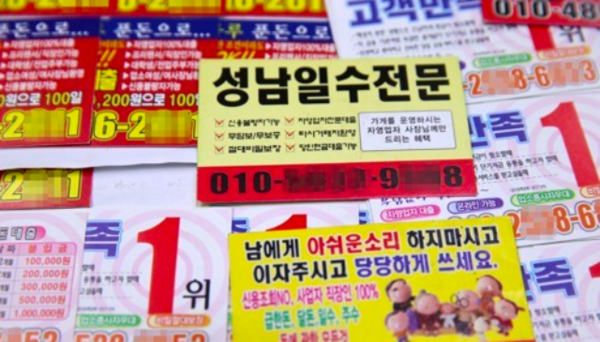Input 2021.01.30 06:00
Amid increasing numbers of common people, whose livelihoods have been difficult due to the novel coronavirus infection (Corona 19), using illegal private financing to seek emergency power, the business behavior of illegal private financing companies is becoming more sophisticated through the use of’non-face-to-face’. This pattern was found as a result of an analysis of 60 cases of actual illegal private finance damage counseling in’Financial alienated sites, common people driven to illegal bonds’ published by the Korea Loan Finance Association on the 30th.

Advertising text messages sent by companies also triggered users to deal with illegal debentures. ‘Corona 19 special support loans for self-employed persons are provided by policy financial institutions such as’Corona 19 Special Support Loans for the People’s Finance Center’ (transformed from the’Social People’s Finance Agency’) In many cases, texts are sent by subtly impersonating the name of a public institution. In the past, the main advertising means have moved from the method of spraying business cards with’monthly change, dispatch, number of days’ to online and mobile.
The way money is paid has also changed. When the authentication number displayed on the toss screen is informed in real time through the Toss ATM Cash Finder function, the creditor entered the authentication number at the ATM to retrieve cash and requested reimbursement using a fintech app.
Intimidation has also diversified from the way he recklessly visited home or work. In some cases, it is a loan condition to share 50 to 100 contacts of acquaintances in the name of’emergency contact network’. If the money cannot be paid back in time, they threaten to return the phone to them. The Internet financial fraud prevention service’The Cheat’ was used to register the name and phone number of the borrower as fraud information when there was a problem.

Jun Mo, a woman in her twenties, said, “I was engaged in counseling at a travel agency, but because of the corona, all employees went on unpaid leave and living expenses were necessary.” Hong Mo, a man in his thirties, said, “I lost my job twice due to the corona crisis, and I got a loan from a loan company to stop the debt.”
The interest burden is also growing every year. As a result of analyzing a total of 5160 transactions by the Association, the average interest rate of illegal private finance last year was 401% per year, reaching 16.7 times the legal maximum interest rate (24% per year). The interest rate is three times higher than in 2019 (145% per year). The average amount they borrowed was 9,200,000 won, and the average transaction period was 64 days. The type of debenture was ▲ 4830 dispatch loans (credit) ▲ 285 daily loans ▲ 45 collateral loans.
An official from the Korea Loan Finance Association said, “Illegal financing users do not need a large amount of money, but need basic living expenses, but there is no place to borrow it, and they are convinced that they have a high interest rate bond.” If you do’blocking back’, the vicious cycle repeats that you will be indebted to you.”
Victims of illegal private finance can get help with debt adjustment through consultation by contacting the Consumer Protection Center of the Korea Loan Finance Association (02-6710-0831) or the Financial Supervisory Service (1332). Any portion that exceeds the legal interest rate may be refunded. If a party is unable to return the excess amount even in an attempted debt settlement, the association breaks down the debt settlement and guides future legal proceedings. If illegal collection is made, a free lawyer can be appointed through the Financial Services Commission or the Legal Aid Corporation (132) through the’debtor agent’ system.
Unregistered loan business is subject to imprisonment for up to 5 years or a fine of up to 50 million won. Violation of the statutory maximum interest rate limit is subject to imprisonment for up to three years or a fine of up to 30 million won, and severe punishment. In the first half of the year, the Financial Services Commission plans to push forward an amendment to the Loan Business Act that will invalidate any excess of 6% if an illegal loan company receives an interest rate of 6% or more per year.
